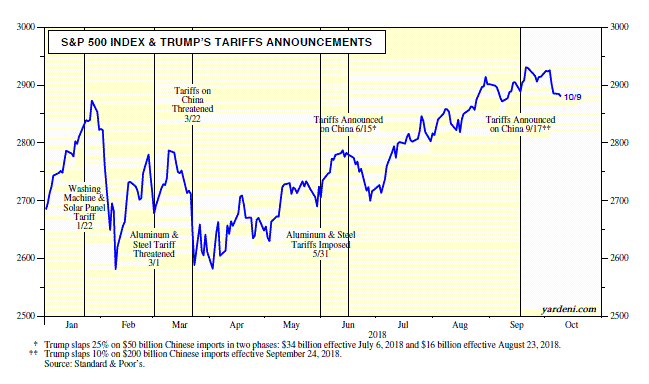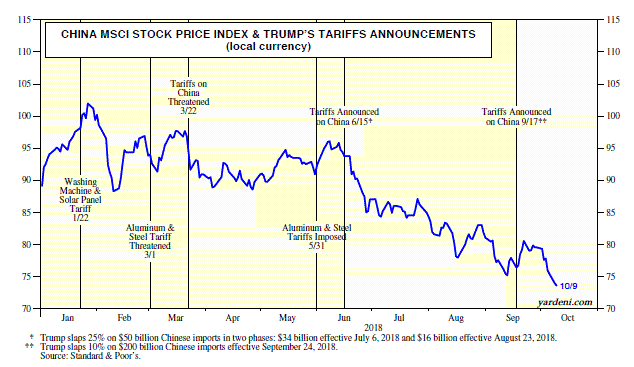
A week ago I wrote about “China’s Syndromes.” I noted that aging demographic forces, which were significantly exacerbated by the Chinese government’s one-child policy, are already depressing the growth rate of real retail sales in China (Fig. 1 and Fig. 2). As a result, the government is scrambling to expand its overseas military and economic power to counter the structural weakness at home.
I argued that President Donald Trump is implementing policies aimed at either slowing or halting China’s drive to become a superpower. He wants to reduce America’s huge trade deficit with China by forcing US and other manufacturers to move out of that country. In the process, the US would no longer be financing China’s ascent with our trade deficit and providing technological know how that has been either stolen or extorted.
I didn’t have to wait long to get confirmation of my working hypothesis. Consider the following fast-paced developments:
(1) The President’s speech. In his 9/25 speech before the United Nations General Assembly, Trump said only the following about China, focusing on trade:
“The United States lost over 3 million manufacturing jobs, nearly a quarter of all steel jobs, and 60,000 factories after China joined the WTO. And we have racked up $13 trillion in trade deficits over the last two decades. But those days are over. We will no longer tolerate such abuse. We will not allow our workers to be victimized, our companies to be cheated, and our wealth to be plundered and transferred. America will never apologize for protecting its citizens. … China’s market distortions and the way they deal cannot be tolerated.”
(2) The Vice President’s speech. In a 10/4 speech at the Hudson Institute, Vice President Mike Pence discussed the administration’s policy toward China in far greater detail. He started out by warning: “Beijing is employing a whole-of-government approach, using political, economic, and military tools, as well as propaganda, to advance its influence and benefit its interests in the United States.”
He accused the Chinese Communist Party of using “an arsenal of policies inconsistent with free and fair trade, including tariffs, quotas, currency manipulation, forced technology transfer, intellectual property theft, and industrial subsidies that are handed out like candy to foreign investment. These policies have built Beijing’s manufacturing base, at the expense of its competitors—especially the United States of America.”
He specifically berated the party’s “Made in China 2025” plan for aiming to control 90% of the “world’s most advanced industries including robotics, biotechnology, and artificial intelligence. To win the commanding heights of the 21st century economy, Beijing has directed its bureaucrats and businesses to obtain American intellectual property—the foundation of our economic leadership—by any means necessary.” He accused the Chinese of stealing US technology including cutting-edge military blueprints. “And using that stolen technology, the Chinese Communist Party is turning plowshares into swords on a massive scale,” he said.
He point-blank accused China of economic and military aggression abroad: “[W]hile China’s leader stood in the Rose Garden at the White House in 2015 and said that his country had, and I quote, ‘no intention to militarize’ the South China Sea, today, Beijing has deployed advanced anti-ship and anti-air missiles atop an archipelago of military bases constructed on artificial islands.” The result has been provocative and dangerous near misses between our two navies in the South China Sea.
Pence also documented instances of China using so-called “debt diplomacy” to expand its influence:
“Today, that country is offering hundreds of billions of dollars in infrastructure loans to governments from Asia to Africa to Europe and even Latin America. Yet the terms of those loans are opaque at best, and the benefits invariably flow overwhelmingly to Beijing.”
The US has responded by boosting defense spending and slapping tariffs on China. These “exercises in American strength” explain why China’s largest stock exchange fell by 25% in the first nine months of this year. Got that? The US is targeting China’s stock market!
Pence accused the Chinese government of oppressing its own people at home. He railed about the Great Firewall of China “restricting the free flow of information to the Chinese people.” Even more frightening, he said, is the “Social Credit Score,” which, according to the official blueprint, will “allow the trustworthy to roam everywhere under heaven, while making it hard for the discredited to take a single step.” It will be implemented in 2020.
Pence also attacked the Chinese government for meddling in US politics in an effort to weaken America. He claimed that in June, “Beijing itself circulated a sensitive document, entitled ‘Propaganda and Censorship Notice.’ It laid out its strategy. It stated that China must, in their words, ‘strike accurately and carefully, splitting apart different domestic groups’ in the United States of America.”
There are lots more complaints about China in Pence’s speech. Clearly, the Trump administration’s policy toward China isn’t just about trade. A 10/5 NYT article critically stated that Pence in effect had declared a “New Cold War” with China. An alternative spin is that Pence was simply recognizing that China has launched an ever-expanding war against American interests.
(3) The poison pill placed in USMCA. A 10/5 CNBC article noted that there is a provision in the newly passed North American trade agreement, the United States-Mexico-Canada Agreement (USMCA, a.k.a. “the new NAFTA”), “which effectively gives Washington a veto over Canada and Mexico’s other free trade partners to ensure that they are governed by market principles and lack the state dominance.” In effect, that’s a “poison pill” aimed at China.
When Trump was elected, I observed that after eight years of government by community organizers, we were about to have a major regime change with government by dealmakers. US Commerce Secretary Wilbur Ross, a consummate wheeler-dealer when he was in the private sector, signaled on Friday that Washington may insist on including this poison-pill provision in future bilateral trade deals. “People can come to understand that this is one of your prerequisites to make a deal,” he said.
(4) JP Morgan’s bearish call. Last Wednesday, JPMorgan strategists wrote in a note that “[a] full-blown trade war becomes our new base case scenario for 2019” with 25% US tariffs imposed on all Chinese goods. They added, “There is no clear sign of mitigating confrontation between China and the U.S. in the near term.” In his 10/5 Barron’s column, Randy Forsyth noted that the bank’s strategists “estimate that 25% levies on all Chinese imports to the U.S. would trim earnings for the S&P 500 by $8 a share, from their original projection of $179 for 2019. ‘Such a downgrade would mark the first of the Trump era and potentially end the U.S. stock market rally, even assuming a forward [price/earnings] multiple of 17, unless some other offset materializes,’ they conclude.”
I agree that Trump will probably slap Chinese goods with an across-the-board 25% tariff. I think that the US economy will be strong enough to boost S&P 500 earnings by 6.8% to $173 per share, which has been our number for next year for a while. I don’t think that the escalating trade war with China will be the event that ends the bull market in the US (Fig. 3). However, it may already be marking the beginning of a severe and prolonged bear market in China (Fig. 4).
While financial markets were closed all last week in China for the Golden Week vacation, Hong Kong stocks fell for four consecutive days as investors grew increasingly concerned that the impact of the trade war is starting to show.
On Sunday, the People’s Bank of China slashed the reserve requirement ratio for large banks (currently 15.5%) and small banks (13.5%) by 100 basis points effective October 15 (Fig. 5). This is the fourth such cut this year. The prime rate is also likely to be cut soon (Fig. 6). Beijing has pledged to expedite plans to invest heavily in infrastructure projects as the economy shows signs of cooling further, with investment growth recently slowing to a record low.
CNBC reported yesterday, “On the back of the central bank’s announcement, China’s mainland markets traded in negative territory for much of their first trading day following the Golden Week holiday. Both the Shanghai Composite and the Shenzhen Composite fell more than 3.7% by the end of the trading day.” The two indexes peaked this year on January 24 and are down 23.7% and 25.0%, respectively (Fig. 7). China’s MSCI is down 26.0% from its peak on January 26. Hong Kong’s Hang Seng is down 21.0% from its peak also on that day (Fig. 8).
(5) Cyber war. The 10/4 Bloomberg Businessweek included a cover story titled “The Big Hack: How China Used a Tiny Chip to Infiltrate U.S. Companies.” The story is based on information from multiple intelligence and business sources who confirmed that Chinese spies attacked almost 30 US companies, including Amazon (NASDAQ:AMZN) and Apple (NASDAQ:AAPL), “by compromising America’s technology supply chain, according to extensive interviews with government and corporate sources.” Operatives of the People’s Liberation Army inserted tiny microchips designed for spying in motherboards made in China and sold to American companies.
Both Amazon and Apple denied they had been hacked. Whether accurate or fake news, the story certainly could convince many companies to cut China out of their supply chains. That would fit in nicely with the Trump administration’s campaign to move production out of China back to the US.
(6) Bottom line. Trump’s fiscal, trade, and sanctions policies have boosted the dollar, oil prices, and interest rates. The risk, of course, is that these developments could punish not only China but lots of other emerging market economies as well. In the US, higher oil prices along with higher interest rates could also weigh on the US economy. Those are the major foreseeable risks. For now, I don’t see this all leading to a financial crisis or a recession. But I’m on alert: There sure are lots of poison pills out there!

